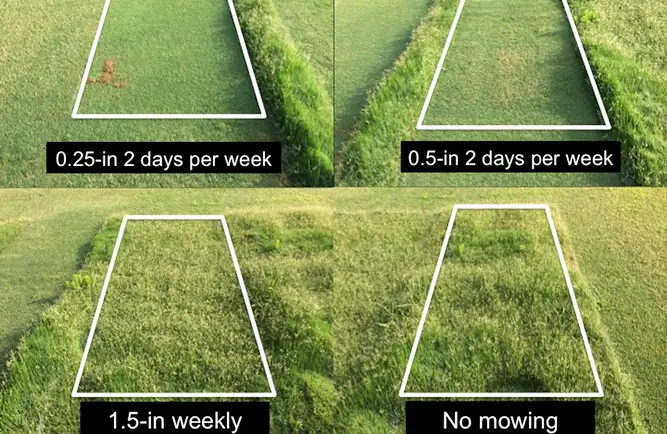Who doesn’t want beautifully organized clean and uniform-looking greenery on their lawn? Dreaming of it already? Well, Bermuda grass is the plant that can give you that look, but you must be thinking about seed heads.
So are Bermuda Seed Head Good or Bad?
No, Bermuda seed heads are not good. It is a clear indication of the unhealthy growth of the Bermuda grass. It must be having excessive water, or growing in a compact area where there is not enough air or sunlight. So it finds its way to survival. It can cause an unhealthy-looking lawn or an allergic reaction in people.
We are not done with the whole concept here. Follow along to know every detail regarding this.
Is Bermuda Seed Head Good or Bad?

Although your lawn having seed heads is a natural process of reproduction for bermuda grass, it is bad. During spring or the coming days of summer, you will see seed heads on your Bermuda grass garden. And the seeds are the signs of stress because not only is it indicating something inappropriate in your garden, but also it can cause health issues.
While you find your Bermuda grass garden is filled with heads, that means your garden is giving you some straight indication. Inappropriate watering, compaction of soil, inappropriate mowing, incorrect soil temperature, shades, and so on are the reasons causing Bermuda grass to seed.
When you see your lawn covered with Bermuda grass and it is discoloring, that is the time when you would know it is due to seed heads. Usually, Bermuda seed heads are brown in color and the seeds are purple colored. It also makes your lawn look thinner and rough rather than healthy and green.
So basically if your Bermuda grass plant is having too much water due to overwatering or excessive rain or the temperature is fluctuating, these can be causing massive growth of seed heads in your garden. So it is very evident that the Bermuda seed head is not a good indication for your garden.
3 Reasons Why Bermuda Seed Head Is Bad
Here are the reasons why Bermuda seed head is bad for your lawn-
Reason 1: Sign of Stress
Bermuda seed head is a sign of stress as it indicates the unhealthy condition of the lawn and surroundings. If there is improper watering in the soil, the temperature is inappropriate and less fertile, and mowing is irregular, then Bermuda grass finds its way to survival. Hence, it starts producing Bermuda heads.
Reason 2: Lawn Looks Rough & Unhealthy
The purpose of having Bermuda grass is to make the lawn look healthy with its dense texture and royal green color. But the presence of the seed head makes it look rough, discolored, and untidy. So, one would never want an unhealthy-looking lawn.
Moreover, you have to spend more time on the lawn to maintain the presence of Bermuda seed heads. So it is the same time stressful for a lawn owner.
Reason 3: Might Cause an Allergy
Bermuda seed head produces a lot of air-borne pollen during their growth period. And the worst part is, it has massive allergenicity. So it might affect the respiratory system, eyes, nose and even cause fever in people who are allergy prone to air-borne pollen.
Bermuda Seed Head: How to Get Rid Of?

To get rid of Bermuda seed heads, you can cut your seed heads to their least size. The acceptable size of Bermuda grass can be up to ¾”.
You have to mow your Bermuda grass at least once a week during the growing season. But first, you need to let the grass grow until it is at the perfect height for mowing. And when you find it growing too fast, cut the seed head twice a week.
For a beautifully organized and eye-soothing lawn, your choice might be Bermuda grass. But before having yours in your place, you need to make sure you know their maintenance and growth properly. Otherwise, you will end up with something which was not in your vision at all.
There is nothing one can do with Bermuda seed heads if they found it growing. They have faced certain stress. But in order to keep your lawn clean and neat, even looking and tidy, you need to get rid of them. Although you can’t control its growth of it, you can keep it under control.
So the first thing that can prevent the growth of massive Bermuda seed heads, would be proper maintenance and care. If your lawn is not taken care of properly, has excessive water and the grasses are growing under compact areas, it would find its way to survival. Hence it will grow a huge amount of seed heads.
Lack of nitrogen is one of the most common reasons for Bermuda seed heads. So you should start fertilizing your lawn properly following the instructions given on the fertilizer packet. You can divide the application of fertilizer into two portions. Side-to-side application and 90-degree angle application. Quick-release nitrogen fertilizers work great in these cases.
Bermuda Grass Maintenance to Avoid Seed Heads

Like every other plant, Bermuda grass also needs proper care for its healthy growth. That can only be possible when you will take care of your bermuda grass appropriately.
Let us know about the care guide in detail to prevent excessive seed heads growth-
Mowing:
You should mow your lawn at least once a week during the grass seed growing season.
After proper mowing, you can further cut it to 1-2 inches tall each time you mow. It’s best to mow not more than twice a week to get rid of disease formation and clumping.
After mowing, you can round up the lawn for a more clean and tidy look.
Watering:
Bermuda grass can grow even in very hot weather, so it doesn’t need much water. On regular bases, you only need one inch of water per week no matter how hot or dry the weather is.
You need to water your grass for a longer period. And, watering in the mid-morning is the best time period.
Fertilizer:
Bermuda grass usually requires fertilizer containing nitrogen. You should precisely maintain the fertilizer amount according to the guideline. You need to fertilize it once a month during summer, fall, and spring.
Insects/Weeds:
You need to herbicide your Bermuda grass lawn during the summertime. But if you are facing a weed problem, then you need to apply a pre-emergent herbicide in the spring when the temperature is above 55 degrees Celsius.
Following these, you would be able to remove weeds like goosegrass and crabgrass.
There can also be an attack of some spring insects like white grubs, for those you are allowed to use insecticides.
If you are looking for a similar kind of lawn grass like bermuda grass, buffalo grass is a good choice.
Frequently Asked Questions (FAQs):
Does Bermuda seed head germinate?
Yes, Bermuda seed heads germinate under proper conditions and surroundings. The grass area has to be moist for the first 2 to 3 weeks to ensure proper germination. So you might need to water them multiple times each time to prevent drying of the soil. Once the growth period is done, you can water less frequently and deeper.
What makes Bermuda grass grow faster?
If you want your bermuda grass to grow faster, you need to add more nutrients to the soil like fertilizers. Nitrogen fertilizer works best in the growth of Bermuda grasses. Other than that, proper watering and sunlight is also important to make sure your grass lawn is having healthy growth. Make sure you apply fertilizer when it’s the growth period of Bermuda grass.
How long Bermuda seed heads last?
Usually, Bermuda seed heads last around 3 weeks and a few more sometimes. So basically, you have to deal with those for quite a long time. However, to get rid of those, you need to mow them regularly and take care of your grass so that it doesn’t grow unhealthy.
Final Words
Hope you have got enough ideas regarding Bermuda Grass Seed Good or Bad. Undoubtedly it will give a divine look to your lawn, but it needs to be taken care of regularly.
But the best part is, once you know the trick to maintain this grass, you will end up having the most satisfactory outcome with it.
Hope it helps you, Happy Planting!
- Why Are There Still No Tomatoes in My Tomato Plants? Let’s Fix the Issue! - July 13, 2023
- Water Propagation White Stuff on Roots: Everything You Should Know! - July 11, 2023
- String of Dolphins Drying Up: Solved! - July 11, 2023
